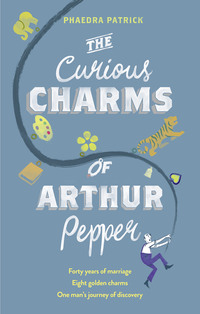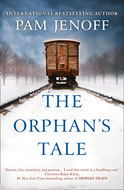Kitap dosya olarak indirilemez ancak uygulamamız üzerinden veya online olarak web sitemizden okunabilir.
Kitabı oku: «The Curious Charms Of Arthur Pepper», sayfa 2
 The Elephant
The Elephant
Arthur gripped the receiver tightly. A voice in his head told him to put it down, to forget about this. Firstly, there was the cost. He was on the phone to India. That couldn’t be cheap. Miriam was always so careful about the phone bill, especially with the cost of phoning Dan in Australia.
And then there was the gnawing feeling that he was prying on his wife. Trust had always formed a great part in their marriage. When he travelled around the country selling locks and safes, Miriam had voiced her concerns that on overnight stays he might succumb to the charms of a comely landlady. He had assured her that he would never do anything to jeopardise his marriage or family life. Besides, he wasn’t the type that women would find attractive. An ex-girlfriend had compared him to a mole. She said that he was timid and a bit twitchy. But, surprisingly, he had been propositioned a few times. Though it was probably because of the loneliness or opportunism of the ladies (and once a man), rather than his own appeal.
Sometimes his working days had been long. He travelled around the country a lot. He especially enjoyed showing off new mortice locks, explaining the latches, snibs and levers to his clients. There was something about locks that intrigued him. They were solid and reliable. They protected you and kept you safe. He loved how his car always smelled of oil and he enjoyed chatting to his customers in their shops. But then along came the internet and online ordering. Locksmiths didn’t need salesmen any longer. The shops that remained open started to order their stock by computer and Arthur found himself confined to a desk job. He used the phone to talk to his clients rather than talking face-to-face. He had never liked the phone. You couldn’t see people smiling or their eyes when they asked questions.
It was hard being away from the kids too, sometimes getting home when they were already in bed. Lucy understood, delighted to see him the next morning. She would fling her arms around his neck and tell him she missed him. Dan was trickier. On the rare occasion that Arthur finished work early, Dan seemed to resent it. ‘I like my time with Mum better,’ he once said. Miriam told Arthur not to take it to heart. Some kids were closer to one parent than the other. It didn’t stop Arthur from feeling guilty about working so hard to provide for his family.
Miriam had vowed that she would always be faithful, no matter what hours he worked, and he trusted that she had been. She never gave him cause to think otherwise. He never saw her flirt with other men or found any evidence that she might ever have strayed. Not that he was looking for it. But sometimes when he got home after working away, he wondered if she’d had company. It must have been hard being alone with the two kids. Not that she ever complained. She was a real trouper was Miriam.
Swallowing a lump that formed in his throat as he thought about his family, he began to move his ear away from the receiver. His hand trembled. Best just to leave this be. Hang up. But then he heard a tinny voice calling out to him. ‘Hello. Mr Mehra speaking. I understand that you are phoning about Miriam Kempster, yes?’
Arthur swallowed. His mouth had gone dry. ‘Yes, that’s right. My name is Arthur Pepper. Miriam is my wife.’ It felt wrong to say that Miriam was my wife, because although she was no longer here they were still married, weren’t they?
He explained how he’d found a charm bracelet and the elephant charm with the engraved number. He had not expected anyone to answer his call. Then he told Mr Mehra that his wife was now dead.
Mr Mehra fell silent. It was over a minute before he spoke again. ‘Oh, my dear sir. I am so sorry. She looked after me so well when I was a boy. But that was many years ago now. I still live in the same house! There is little movement in our family. We have the same phone number. I am a doctor and my father and grandfather were doctors before me. I have never forgotten Miriam’s kindness. I hoped that one day I might find her again. I should have tried harder.’
‘She looked after you?’
‘Yes. She was my ayah. She looked after me and my younger sisters.’
‘Your childminder? Here in England?’
‘No, sir. In India. I live in Goa.’
Arthur couldn’t speak. His mind went numb. He knew nothing of this. Miriam had never mentioned living in India. How could this be? He stared at the pot pourri stuffed leaf in the hallway twirling and hanging by a thread.
‘May I tell you a little about her, sir?’
‘Yes. Please do,’ he murmured. Anything to fill in some gaps, tell him that this must be some other Miriam Kempster they were talking about.
Mr Mehra’s voice was soothing and authoritative. Arthur didn’t think about his phone bill. More than anything he wanted to hear from someone else who might have known and loved Miriam, even if this man was a stranger to him. Sometimes not talking about her made it feel like her memory was fading away.
‘We had many ayahs before Miriam joined us. I was a naughty child. I played tricks on them. I put newts in their shoes and chilli flakes in their soup. They didn’t last long. But Miriam was different. She ate the hot food and didn’t say a word. She picked the newts out of her shoes and put them back in the garden. I studied her face but she was a fine actress. She never gave anything away and I didn’t know if she was annoyed with me, or amused. Slowly I gave up teasing her. There was no point. She knew all my tricks! I remember that she had a bag of wonderful marbles. They were as shiny as the moon and one was like a real tiger’s eye. She didn’t care if she kneeled in the dust.’ He gave a throaty laugh. ‘I was a little in love with her.’
‘How long did she stay with your family?’
‘For a few months, in India. I was very broken-hearted when she left. It was my entire fault. That is something I have never told anyone before. But you, Mr Pepper, deserve to know. It is a shame I have carried with me for all these years.’
Arthur shifted nervously in his seat.
‘Do you mind if I tell you? It would mean a great deal to me. It is like a secret burning a hole in my stomach.’ Mr Mehra didn’t wait for a response before he carried on his story. ‘I was only eleven but I loved Miriam. It was the first time I had noticed a girl. She was so pretty and always wore such classy clothes. Her laughter, well, it sounded like tiny bells. When I woke up in the morning she was the first thing I thought about and when I went to bed I looked forward to the next day. I know now that this was not true love like when I met my wife, Priya, but for a young boy it was very real. She was very different to the girls I went to school with. She was exotic, with her alabaster skin and hair the colour of walnuts. Her eyes were like aquamarines. I probably followed her around a little too much, but she never made me feel foolish. My mother had died when I was very young and I used to ask Miriam to sit with me in her room. We would look through my mother’s jewellery box together. She loved the elephant charm. We used to look through the emerald and see the world in green.’
So, it is a real emerald, Arthur thought.
‘But then Miriam began to go out on her own twice a week. We spent a little less time together. I was old enough not to need an ayah but my two sisters did. She was there for them but not so much for me. I followed her one day and she met with a man. He was a teacher at my school. An English man. He came around to the house and he and Miriam took afternoon tea. I saw that he liked her. He picked a hibiscus flower from the garden to give to her.
‘Mr Pepper. I was a young boy. I was growing and had hormones roaring around my body. I felt very angry. I told my father that I had seen Miriam and the man kissing. My father was a very old-fashioned man and he had already lost one ayah because of similar circumstances. So there and then he went to find Miriam and told her to leave. She was so surprised but she acted with dignity and packed her suitcase.
‘I was devastated. I had not meant this to happen. I took the elephant from the jewellery box and ran to the village to have it engraved. I pushed it into the front pocket of her suitcase as it stood by the door. I was too much of a coward to say goodbye, but she found me hiding and gave me a kiss. She said, “Goodbye, dearest Rajesh.” And I never saw her again.
‘From that day, Mr Pepper, I swear I have tried never to tell a lie. I only tell the truth. It is the only way. I prayed that she could forgive me. Did she say that to you?’
Arthur knew nothing about this part of his wife’s life. But he knew this was the same woman that they had both loved. Miriam’s laughter did sound like tiny bells. She did have a bag of marbles, which she gave to Dan. He was still reeling from astonishment, but he could hear the longing in Mr Mehra’s voice. He cleared his throat. ‘Yes, she forgave you long ago. She spoke of you kindly.’
Mr Mehra laughed out loud. A short ‘Ha ha!’ Then he said, ‘Mr Pepper! You have no idea how happy your words make me feel. For years this has felt like a huge weight for me. Thank you for taking the trouble to ring me. I am so sorry to hear that Miriam is no longer with you.’
Arthur felt a glow in his stomach. It was something that he hadn’t felt for a long time. He felt useful.
‘You were a lucky man to be married for so long, yes? To have a wife such as Miriam. Did she have a happy life, sir?’
‘Yes. Yes, I think she did. It was a quiet life. We have two lovely children.’
‘Then you must try to be happy. Would she want you to be sad?’
‘No. But it’s hard not to be.’
‘I know this. But there is much to celebrate about her.’
‘Yes.’
Both men fell silent.
Arthur turned the bracelet around in his hand. He now knew about the elephant. But what about the other charms? If he didn’t know about Miriam’s life in India, what stories did the other charms hold? He asked Mr Mehra if he knew anything about the bracelet.
‘I only gave her the elephant. She did write to me once, a few months after she left, to say thank you. I’m a sentimental fool and I still have the letter. I always told myself that I would get in touch, but I felt too ashamed about my lie. I can see what address is on the letter if you like?’
Arthur swallowed. ‘That would be most kind.’
He waited for five minutes until Mr Mehra returned to the call. He reached out to stop the pot pourri leaf from twirling. He flicked through the leaflets Bernadette had posted through the door.
‘Ah, yes, here it is—Graystock Manor in Bath, England, 1963. I hope this helps with your search. She talks in the letter about staying with friends there. There’s something about tigers in the grounds.’
‘There is a tiger charm on the bracelet,’ Arthur said.
‘Aha. Then that might be your next port of call. You will find out the stories of the charms one by one, yes?’
‘Oh, this isn’t a search,’ Arthur started. ‘I was just curious …’
‘Well, if you are ever in India, Mr Pepper, you must look me up. I will show you the places that Miriam loved. And her old room. It hasn’t changed much over the years. You would like to see it?’
‘That’s very decent of you. Though I’m afraid I’ve never left the UK before. I can’t see myself travelling to India any time soon.’
‘There is always a first time, Mr Pepper. You bear my offer in mind, sir.’
Arthur said goodbye and thank you for the invitation. As he placed the receiver down, Mr Mehra’s words rolled over and over in his head: . . next port of call … finding out the stories of the charms one by one …
And he began to wonder.
 The Great Escape
The Great Escape
It was still dark the next morning when Arthur woke. The digits on his alarm clock flicked to 5:32 a.m. and he lay for a while staring at the ceiling. Outside a car drove past and he watched the reflection of the headlights sweep over the ceiling like the rays of a lighthouse across water. He let his fingers creep across the mattress, reaching out for Miriam’s hand knowing it wasn’t there and feeling only cool cotton sheet.
Each night, when he went to bed, it struck him how chilly it was without her. When she was next to him he always slept through the night, gently drifting off, then waking to the sound of thrushes singing outside. She would shake her head and ask did he not hear the thunderstorm or next door’s house alarm going off? But he never did.
Now his sleep was fitful, restless. He woke up often, shivering and wrapping the duvet around him in a cocoon. He should put an extra blanket on the bed, to stop the cold from creeping around his back and numbing his feet. His body had found its own strange rhythm of sleeping, waking, shivering, sleeping, waking, shivering, which, although uncomfortable, he didn’t want to shake. He didn’t want to drop off and then wake with the birds and find that Miriam was no longer there. Even now that would be too much of a shock. Stirring through the night reminded him that she had gone and he welcomed those constant reminders. He didn’t want to risk forgetting her.
If he had to describe in one word how he felt this morning, it would be perplexed. Getting rid of Miriam’s clothes was going to be a ritual, freeing the house of her things, her shoes, her toiletries. It was a small step in coping with his loss and moving on.
But the newly-discovered charm bracelet was an obstacle to his intentions. It raised questions where once there were none. It had opened a door and he had stepped through it.
He and Miriam differed in how they saw mysteries. They regularly enjoyed a Miss Marple or a Hercule Poirot on a Sunday afternoon. Arthur would watch intently. ‘Do you think it’s him?’ he would say. ‘He’s being very helpful and his character adds nothing to the story. I think he might be the killer.’
‘Watch the film.’ Miriam would squeeze his knee. ‘Just enjoy it. You don’t have to psychoanalyse all the characters. You don’t have to guess the ending.’
‘But, it’s a mystery. It’s supposed to make you guess. We’re supposed to try and work it out.’
Miriam would laugh and shake her head.
If this were the other way round and (he hated to think this) he had died, Miriam might not have given finding a strange object in Arthur’s wardrobe much thought. Whereas here he was, his brain whirring like a child’s windmill in the garden.
He creaked out of bed and took a shower, letting the hot water bounce off his face. Then he dried himself off, had a shave, put on his grey trousers, blue shirt and mustard tank top and headed downstairs. Miriam liked it when he wore these clothes. She said they made him look presentable.
For the first weeks after she died, he couldn’t even be bothered getting dressed. Who was there to make an effort for? With his wife and children gone, why should he care? He wore his pyjamas day and night. For the first time in his life he grew a beard. When he saw himself in the bathroom mirror he was surprised at his resemblance to Captain Birdseye. He shaved it off.
He left radios on in each room so he wouldn’t have to hear his own footsteps. He survived on yoghurts and cans of soup, which he didn’t bother to heat. A spoon and a can opener were all he needed. He found himself small jobs to do: tightening the bolts on the bed to stop it squeaking, scratching out the blackened grout around the bath.
Miriam kept a fern on the windowsill in the kitchen. It was a moth-eaten thing with drooping feathery leaves. He despised it at first, resenting how such a pathetic thing could live when his wife had died. It had sat on the floor by the back door waiting for bin day. But, out of guilt, he relented and set it back in its place. He named it Frederica and began to water and talk to it. And slowly she perked up. She no longer drooped. Her leaves grew greener. It felt good to nurture something. He found it easier to chat to the plant than to people. It was good for him to keep busy. It meant he didn’t have time to be sad.
Well, that’s what he told himself, anyway. But then he’d be going about his daily tasks, kind of doing okay, holding it together. Then he’d spy the green pot pourri fabric leaf hanging in the hallway or Miriam’s mud-encrusted walking shoes in the pantry, or the lavender Crabtree & Evelyn hand cream on the shelf in the bathroom—and it would feel like a landslide. Such small meaningless items now tore at his heart.
He would sit on the bottom step of the stairs and hold his head in his hands. Rocking backward and forward, squeezing his eyes shut, he told himself that he was bound to feel like this. His grief was still raw. It would pass. She was in a better place. She wouldn’t want him to be like this. Blah blah. All the usual mumbo-jumbo from Bernadette’s leaflets. And it did pass. But it never vanished completely. He carried his loss around with him like a bowling ball in the pit of his stomach.
At these times he imagined his own father, stern, strong: ‘Bloody ‘ell. Pull yerself together, lad. Crying’s for sissies,’ and he would lift his chin and try to be brave.
Perhaps he should be getting over it by now.
His recollections of those dark early days were foggy. What he did recall was like seeing it on a black-and-white TV set with a crackly picture. He saw himself shuffling around the house.
If he was honest, then Bernadette had been a great help.
She had turned up on his doorstep like an unwelcome genie and insisted that he bathed while she cooked lunch. Arthur hadn’t wanted to eat. Food held no taste or pleasure for him.
‘Your body is like a steam train that needs coal,’ Bernadette said as he protested against the pies, soups and stews she carried over his threshold, heated and then placed in front of him. ‘How are you going to carry on your journey without fuel?’
Arthur wasn’t planning any journey. He didn’t want to leave the house. The only trip he made was upstairs to use the bathroom or go to bed. He had no desire to do anything more than that. For a quiet life he ate her food, blocked out her chatter, read her leaflets. He really would prefer to be left alone.
But she persisted. Sometimes he answered the door to her, other times he wriggled down in the bed and pulled the blankets over his head or thrust himself into National Trust statue mode. But she never gave up on him.
Later that morning, as if she knew he was thinking of her, Bernadette rang his doorbell. Arthur stood in the dining room, still for a few moments, wondering whether to go to the door. The air smelled of bacon and eggs and fresh toast as the other residents of Bank Avenue enjoyed their breakfasts. The doorbell rang again.
‘Her husband Carl died recently,’ Miriam had told him, a few years ago, as she spied Bernadette on a stall at a local church fete, selling butterfly buns and chocolate cake. ‘I think that bereaved people act in one of two ways. There are those who cling with their fingertips to the past, and those who brush their hands together and get on with their lives. That lady with the red hair is the latter. She keeps herself busy.’
‘Do you know her?’
‘She works at LadyBLovely, the boutique in the village. I bought a navy dress from there. It has tiny pearl buttons. She told me that, in her husband’s memory, she was going to help others through her baking. She said that if people are tired, lonely, heartbroken, or have simply run out of steam, then they need food. I think it’s very courageous of her to make it her mission to help others.’
From then on Arthur noticed Bernadette more—at the local school summer fair, in the post office, in her dressing gown tending roses in her garden. They said hello to each other and not much else. Sometimes he saw Bernadette and Miriam chatting on the street corner. They would laugh and talk about the weather and how strawberries were sweet this year. Bernadette’s voice was so loud that he could hear the conversation from inside the house.
Bernadette had attended Miriam’s funeral. He had a hazy memory of her appearing beside him and patting his arm. ‘If you ever need anything, just ask,’ she said and Arthur wondered what he might possibly ever ask her for. Then she had started to turn up announced on his doorstep.
At first he felt irritated by her presence, then he began to worry that she had set her sights on him, perhaps as a potential second husband. He wasn’t looking for anything like that. He never could do after Miriam. But in all the months she had been knocking on his door, Bernadette hadn’t ever given him cause to think her attention was anything more than platonic. She had a full roster of widows and widowers to call upon.
‘Mince and onion pie,’ she greeted him as he opened up. ‘Freshly made.’ She let herself into the hallway, pie-first. There, she ran her finger along the shelf over the radiator and nodded with satisfaction that it was dust free. She sniffed the air. ‘It’s a bit musty in here. Do you have air freshener?’
Arthur marvelled at how impolite she could be without realising and dutifully fetched one. A few seconds later and the cloying smell of Mountain Lavender filled the air.
She bustled into the kitchen and put the pie down on the worktop. ‘This is a mighty fine kitchen,’ she said.
‘I know.’
‘The cooker is wondrous.’
‘I know.’
Bernadette was the polar opposite to Miriam. His wife had sparrow bones. Bernadette was fleshy, cushioned. Her hair was dyed post-box red and she wore diamanté studs on the tips of her nails. One of her front teeth was stained yellow. Her voice was big, cutting through the quiet of his home like a machete. He jangled the bracelet nervously in his pocket. Since speaking to Mr Mehra last night, he had kept it with him. He had studied each charm in turn several times.
India. It was so far away. It must have been such an adventure for Miriam. Why had she not wanted him to know? Surely Mr Mehra’s story wasn’t enough for her to keep it secret.
‘Are you okay, Arthur? You’re in a dream world.’ Bernadette’s words broke his thoughts.
‘Me? Yes, of course.’
‘I called yesterday morning but you weren’t in. Did you go to Men in Caves?’
Men in Caves was a community group for single men. Arthur had been twice to find a group of men with gloomy expressions handling chunks of wood and tools. The man who ran it, Bobby, was shaped like a skittle with a tiny head and large body. ‘Men need caves,’ he trilled. ‘They need somewhere to retreat to and be at one with themselves.’
Arthur’s neighbour with the dreadlocks had been there. Terry. He was busy filing a piece of wood. ‘I like your car,’ Arthur said to be polite.
‘It’s actually a tortoise.’
‘Oh.’
‘I saw one last week when I was mowing my lawn.’
‘A wild one?’
‘It belongs to the red-haired kids who wear nothing on their feet. It escaped.’
Arthur didn’t know what to say. He had enough trouble with cats on his rockery without a tortoise being on the loose too. Returning to his own work, he made a wooden plaque with the number of his house on it—37. The 3 was much bigger than the 7 but he hung it on his back door anyway.
It would have been easy to say yes, he was at Men in Caves, even though it had been too early in the morning. But Bernadette was standing and smiling at him. The pie smelled delicious. He didn’t want to lie to her, especially after hearing Mr Mehra’s regret over telling lies about Miriam. He would do the same and try not to lie again. ‘I hid from you yesterday,’ he said.
‘You hid?’
‘I didn’t want to see anyone. I’d set myself the task to clear out Miriam’s wardrobe and so when you rang the doorbell, I stood very still in the hallway and pretended not to be at home.’ The words tumbled off his tongue and it felt surprisingly good to be this honest. ‘Yesterday was the first anniversary of her death.’
‘That’s very truthful of you, Arthur. I appreciate your honesty. I can see how that would be upsetting. When Carl died … well, it was a hard thing to let him go. I gave his tools to Men in Caves.’
Arthur felt his heart dip. He hoped that she wouldn’t tell him about her husband. He didn’t want to trade stories of death. There seemed to be a strange one-upmanship amongst people who had lost spouses. Only last week in the post office he had witnessed what he would describe as boasting amongst a group of four pensioners.
—‘My wife suffered for ten years before she eventually passed away.’
—‘Really? Well, my Cedric was flattened by a lorry. The paramedics said they’d never seen anything like it. Like a pancake, one said.’
—Then a man’s voice, breaking. ‘It was the drugs, I reckon. Twenty-three tablets a day they gave her. She almost rattled.’
—‘When they cut him open there was nothing left inside. The cancer had eaten him all up.’
They talked about their loved ones as if they were objects. Miriam would always be a real person to him. He wouldn’t trade her memory like that.
‘She likes lost causes,’ Vera, the post office mistress, said to him as he took a pack of small brown manila envelopes to the counter. She always wore a pencil tucked into her round tortoiseshell glasses and made it her business to know everything and everyone in the village. Her mother had owned the post office before her and had been exactly the same.
‘Who does?’
‘Bernadette Patterson. We’ve noticed that she brings you pies.’
‘Who has noticed?’ Arthur said, feeling angry. ‘Is there a club whose role it is to pry into my life?’
‘No, just my customers having a friendly information exchange. That’s what Bernadette does. She’s kind to the hopeless, helpless and useless.’
Arthur paid for his envelopes and marched out.
He stood and switched on the kettle. ‘I’m giving Miriam’s things to Cat Saviours. They sell clothes, ornaments and things to raise money to help mistreated cats.’
‘That’s a nice idea, though I prefer small dogs myself. They’re much more appreciative.’
‘I think Miriam wanted to help cats.’
‘Then that’s what you must do. Shall I pop this pie in the oven for you? We can have lunch together. Unless you have other plans …’
He was about to murmur something about being busy but then remembered Mr Mehra’s story again. He had no plans. ‘No, nothing in the diary,’ he said.
Twenty minutes later as he dug his knife into the pie, he thought about the bracelet again. Bernadette could give him a woman’s perspective. He wanted someone to tell him that it was of no significance and that, although it looked expensive, you could buy good reproductions cheaply these days. But he knew the emerald in the elephant was real. And she might gossip about it to Post Office Vera and to her lost causes.
‘You should get out more,’ she said. ‘You only went to Men in Caves once.’
‘I went twice. I do get out.’
She raised an eyebrow. ‘Like to where?’
‘Is this Mastermind? I don’t remember applying.’
‘I’m just trying to take care of you.’
She saw him as a lost cause, just as Vera had implied.
He didn’t want to feel like this, be treated like this. An urge swelled in his chest. He needed to say something so she wouldn’t think him helpless, hopeless and useless, like Mrs Monton who hadn’t left her house in five years and who smoked twenty Woodbines a day, or Mr Flowers who thought there was a unicorn living in his greenhouse. Arthur had some pride left. He used to have meaning as a father and a husband. He used to have thoughts and dreams and plans.
Thinking of the forwarding address Miriam had left on her letter to Mr Mehra, he cleared his throat. ‘Well, if you must know,’ he said hurriedly, ‘I’ve been thinking about going to Graystock Manor in Bath.’
‘Oh yes,’ Bernadette mused. ‘That’s where the tigers roam free.’
Bernadette was a one-woman almanac of the UK. She and Carl had toured everywhere together in their luxury campervan. The back of Arthur’s neck bristled as he prepared to hear where he should and shouldn’t go, what he should and shouldn’t do, at Graystock.
As she busied herself in his kitchen, straightening his scales and checking that his knives were clean enough, Bernadette recited what she knew.
No, Arthur didn’t know that five years ago Lord Graystock had been mauled by a tiger, which sank its teeth and claws into his calf, and now he walked with a limp. He also didn’t know that, as a younger man, Graystock kept a harem of women of all nationalities, like a hedonistic Noah’s ark, or that he was renowned for hosting wild orgies at his manor in the sixties. He also didn’t know that the lord only wore the colour electric blue, even his underwear, because he had once been told in a dream that it was lucky. (Arthur wondered if he had been wearing electric blue during the tiger attack.)
He also now knew that Lord Graystock tried to sell his manor to Richard Branson; however the two men had fallen out and refused to speak to each other ever again. The lord was now a recluse and only opened up Graystock Manor on Fridays and Saturdays and the public were no longer allowed to look at the tigers.
After Bernadette’s tales, Arthur now felt well informed about Lord Graystock’s life and times.
‘It’s just the gift shop and gardens that are open now. And they’re a bit tatty.’ Bernadette finished cleaning Arthur’s mixer taps with a flourish. ‘Why are you going there?’
Arthur looked at his watch. He wished he hadn’t said anything now. She had taken twenty-five minutes to regale him. His left leg had grown stiff. ‘I thought it would be a nice change,’ he said.
‘Well, actually, Nathan and I are going to be down in Worcester and Cheltenham next week. We’re looking at universities. Tag along if you like. You could head off to Graystock on the train from there.’








